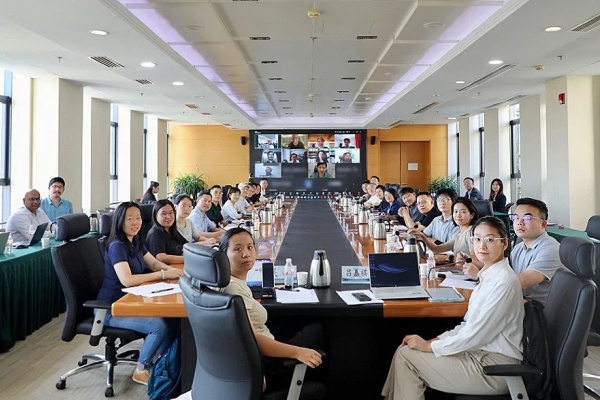
- Home
- Media Center
-
Events
- Wuzhen Summit
- Regional Forums
- Practice Cases of Jointly Building a Community with a Shared Future in Cyberspace
- World Internet Conference Awards for Pioneering Science and Technology
- The Light of Internet Expo
- Straight to Wuzhen Competition
- Global Youth Leadership Program
- WIC Distinguished Contribution Award
- Membership
- Research & Cooperation
- Digital Academy
-
Reports
- Collection of cases on Jointly Building a Community with a Shared Future in Cyberspace
- Collection of Shortlisted Achievements of World Internet Conference Awards for Pioneering Science and Technology
- Reports on Artificial Intelligence
- Reports on Cross—Border E—Commerce
- Reports on Data
- Outcomes of Think Tank Cooperation Program
- Series on Sovereignty in Cyberspace Theory and Practice
- Other Achievements
- About WIC
- 中文 | EN

WIC calls on AI governance and sustainable development

The WIC hosted a seminar on artificial intelligence governance, ethics, and risk management for sustainable development in Beijing on Sept 13. [Photo/wicinternet.org]
Addressing artificial intelligence (AI) governance, ethics, and risk management for sustainable development, the World Internet Conference (WIC) hosted a seminar in Beijing on Sept 13, bringing together nearly 40 experts and scholars from AI-related international organizations, universities, think tanks, and leading enterprises.
Participants joined both online and offline to share their ideas on AI safety and governance, ethical principles, and capacity building, emphasizing that AI governance is more about guiding AI to a path of sustainable development and bringing more benefits to mankind.
At the seminar, a representative of the WIC announced plans to establish the WIC Specialized Committee on Artificial Intelligence. Leveraging the WIC's role as a platform for international cooperation and exchanges, the committee will build global consensus and advance cooperation on AI development and governance through thematic seminars, outcome sharing, and public goods launch, with particular focus on technological innovation, global governance, and industrial development.
Participants highlighted the shift in AI governance from theoretical frameworks to practical implementation, voicing strong support for the committee’s role in driving global AI governance. They stressed the need for the committee to carry out more research on AI governance framework, capacity building, intellectual property protection, data privacy, ethical standards, and potential social risks, as well as to improve the interoperability of AI governance frameworks through extensive international cooperation. It is also imperative to promote best practices of AI governance and to improve multilateral governance mechanisms through collaborative efforts, they noted.
Zeng Yi, director of the International Research Center for AI Ethics and Governance of the Institute of Automation at the Chinese Academy of Sciences and director of Beijing Institute of AI Safety and Governance, co-chaired the seminar. Speakers included Seán Ó hÉigeartaigh, program director of the AI: Futures and Responsibility at the University of Cambridge; Stuart Russell, professor of computer science at the University of California, Berkeley; Jimena Sofia Viveros Alvarez, member of UN high-level advisory body on Artificial Intelligence and chief of staff and head legal advisor to Justice Loretta Ortiz at the Mexican Supreme Court; Yao Xin, vice-president of Lingnan University; Pascale Fung, chair professor of department of electronic and computer engineering at the Hong Kong University of Science & Technology; Helen Mei-ling Meng, Patrick Huen Wing Ming professor of systems engineering & engineering management at the Chinese University of Hong Kong; Zhang Rong, chief security officer at Alibaba Cloud’s Tongyi Laboratory; and Ye Chenhui, head of AI Research at Bell Labs China of Nokia Shanghai Bell.
Representatives from various international organizations, academic institutes, think tanks, and enterprises, including the Arab Information & Communication Technologies Organization, Sri Lanka Computer Emergency Readiness Team, Peking University, Beijing University of Posts and Telecommunications, Chinese Academy of Social Sciences, Renmin University of China, China University of Political Science and Law, Das-Security, Fuxi Institution, China Branch of the BRICS Institute of Future Networks (Shenzhen), Lenovo, MiniMax, Shanghai Artificial Intelligence Laboratory, Tencent, Yinxiang Biji, Cloud Security Alliance, ZTE Corporation, China Telecom, China Internet Network Information Center, China Academy of Information and Communications Technology, and Zhongguancun Laboratory, held discussions and shared their views on the priorities, structure, and prospective outcomes of the forthcoming committee.

The World Internet Conference (WIC) was established as an international organization on July 12, 2022, headquartered in Beijing, China. It was jointly initiated by Global System for Mobile Communication Association (GSMA), National Computer Network Emergency Response Technical Team/Coordination Center of China (CNCERT), China Internet Network Information Center (CNNIC), Alibaba Group, Tencent, and Zhijiang Lab.





